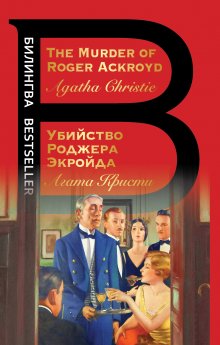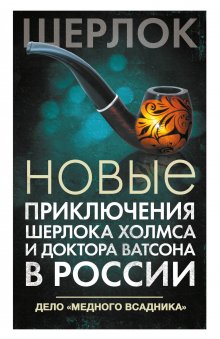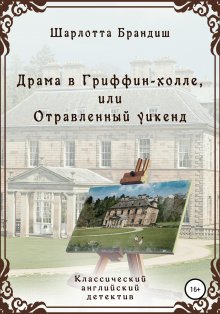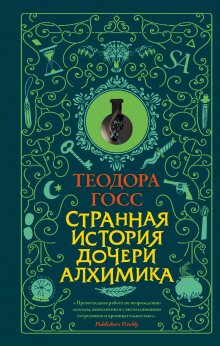Агата Кристи - The Murder of Roger Ackroyd / Убийство Роджера Экройда

Все авторские права соблюдены. Напишите нам, если Вы не согласны.
Описание книги "The Murder of Roger Ackroyd / Убийство Роджера Экройда"
Описание и краткое содержание "The Murder of Roger Ackroyd / Убийство Роджера Экройда" читать бесплатно онлайн.
Parker transferred a respectful attention to Poirot.
‘Parker,’ said the little man, ‘when you broke down the door with dr Sheppard last night, and found your master dead, what was the state of the fire?’
Parker replied without a pause.
‘It had burned very low, sir. It was almost out.’
‘Ah!’ said Poirot. The exclamation sounded almost triumphant. he went on: ‘Look round you, my good Parker. Is this room exactly as it was then?’
The butler’s eye swept round. It came to rest on the windows.
‘The curtains were drawn, sir, and the electric light was on.’
Poirot nodded approval.
‘Anything else?’
‘Yes, sir, this chair was drawn out a little more.’ he indicated a big grandfather chair to the left of the door between it and the window. I append a plan of the room with the chair in question marked with an X.
‘Just show me,’ said Poirot.
The butler drew the chair in question out a good two feet from the wall, turning it so that the seat faced the door.
‘Voilà ce qui est curieux,’ murmured Poirot. ‘No one would want to sit in a chair in such a position, I fancy. Now who pushed it back into place again, I wonder? did you, my friend?’
‘No, sir,’ said Parker. ‘I was too upset with seeing the master and all.’
Poirot looked across at me.
‘Did you, doctor?’
I shook my head.
‘It was back in position when I arrived with the police, sir,’ put in Parker. ‘I’m sure of that.’
‘Curious,’ said Poirot again.
‘Raymond or Blunt must have pushed it back,’ I suggested. ‘Surely it isn’t important?’
‘It is completely unimportant,’ said Poirot. ‘That is why it is so interesting,’ he added softly.
‘Excuse me a minute,’ said colonel Melrose. he left the room with Parker.
‘Do you think Parker is speaking the truth?’ I asked.
‘About the chair, yes. otherwise I do not know. you will find, M. le docteur, if you have much to do with cases of this kind, that they all resemble each other in one thing.’
‘What is that?’ I asked curiously.
‘Everyone concerned in them has something to hide.’
‘Have I?’ I asked, smiling.
Poirot looked at me attentively.
‘I think you have,’ he said quietly.
‘But-’
‘Have you told me everything known to you about this young man Paton?’ He smiled as I grew red. ‘Oh! do not fear. I will not press you. I shall learn it in good time.’
‘I wish you’d tell me something of your methods,’ I said hastily, to cover my confusion. ‘The point about the fire, for instance?’
‘Oh! That was very simple. You leave Mr Ackroyd at – ten minutes to nine, was it not?’
‘Yes, exactly, I should say.’
‘The window is then closed and bolted and the door unlocked. At a quarter past ten when the body is discovered, the door is locked and the window is open. Who opened it? Clearly only Mr Ackroyd himself could have done so, and for one of two reasons. Either because the room became unbearably hot, but since the fire was nearly out and there was a sharp drop in temperature last night, that cannot be the reason, or because he admitted someone that way. And if he admitted someone that way, it must have been someone well known to him, since he had previously shown himself uneasy on the subject of that same window.’
‘It sounds very simple,’ I said.
‘Everything is simple, if you arrange the facts methodically. We are concerned now with the personality of the person who was with him at nine-thirty last night. everything goes to show that that was the individual admitted by the window, and though Mr Ackroyd was seen alive later by Miss Flora, we cannot approach a solution of the mystery until we know who that visitor was. The window may have been left open after his departure and so afforded entrance to the murderer, or the same person may have returned a second time. Ah! here is the colonel who returns.’
Colonel Melrose entered with an animated manner.
‘That telephone call has been traced at last,’ he said. ‘It did not come from here. It was put through to Dr Sheppard at 10.15 last night from a public call office at king’s Abbot station. And at 10.23 the night mail leaves for Liverpool.’
Chapter 8
Inspector Raglan is Confident
We looked at each other.
‘You’ll have inquiries made at the station, of course?’ I said.
‘Naturally, but I’m not over sanguine as to the result. you know what that station is like.’
I did. king’s Abbot is a mere village, but its station happens to be an important junction. Most of the big expresses stop there, and trains are shunted, re-sorted, and made up. It has two or three public telephone boxes. At that time of night, three local trains come in close upon each other, to catch the connection with the express for the north which comes in at 10.19 and leaves at 10.23. The whole place is in a bustle, and the chances of one particular person being noticed telephoning or getting into the express are very small indeed.
‘But why telephone at all?’ demanded Melrose. ‘That is what I find so extraordinary. There seems no rhyme or reason in the thing.’
Poirot carefully straightened a china ornament on one of the bookcases.
‘Be sure there was a reason,’ he said over his shoulder.
‘But what reason could it be?’
‘When we know that, we shall know everything. This case is very curious and very interesting.’
There was something almost indescribable in the way he said those last words. I felt that he was looking at the case from some peculiar angle of his own, and what he saw I could not tell. he went to the window and stood there, looking out.
‘You say it was nine o’clock, dr Sheppard, when you met this stranger outside the gate?’
He asked the question without turning round.
‘Yes,’ I replied. ‘I heard the church clock chime the hour.’
‘How long would it take him to reach the house – to reach this window, for instance?’
‘Five minutes at the outside. Two or three minutes only if he took the path at the right of the drive and came straight here.’
‘But to do that he would have to know the way. how can I explain myself? – it would mean that he had been here before – that he knew his surroundings.’
‘That is true,’ replied colonel Melrose.
‘We could find out, doubtless, if Mr Ackroyd had received any strangers during the past week?’
‘Young Raymond could tell us that,’ I said.
‘Or Parker,’ suggested colonel Melrose.
‘Ou tous les deux,’ suggested Poirot, smiling.
Colonel Melrose went in search of Raymond, and I rang the bell once more for Parker. Colonel Melrose returned almost immediately, accompanied by the young secretary, whom he introduced to Poirot. Geoffrey Raymond was fresh and debonair as ever. He seemed surprised and delighted to make Poirot’s acquaintance.
‘No idea you’d been living among us incognito, M. Poirot,’ he said. ‘It will be a great privilege to watch you at work – hallo, what’s this?’
Poirot had been standing just to the left of the door. Now he moved aside suddenly, and I saw that while my back was turned he must have swiftly drawn out the armchair till it stood in the position Parker had indicated.
‘Want me to sit in the chair whilst you take a blood test?’ asked Raymond good-humouredly. ‘What’s the idea?’
‘M. raymond, this chair was pulled out – so – last night when Mr Ackroyd was found killed. Someone moved it back again into place. Did you do so?’
The secretary’s reply came without a second’s hesitation. ‘No, indeed I didn’t. I don’t even remember that it was in that position, but it must have been if you say so. Anyway, somebody else must have moved it back to its proper place. Have they destroyed a clue in doing so? Too bad!’
‘It is of no consequence,’ said the detective. ‘of no consequence whatever. What I really want to ask you is this, M. raymond: did any stranger come to see Mr Ackroyd during this past week?’
The secretary reflected for a minute or two, knitting his brows, and during the pause Parker appeared in answer to the bell.
‘No,’ said Raymond at last. ‘I can’t remember anyone. Can you, Parker?’
‘I beg your pardon, sir?’
‘Any stranger coming to see Mr Ackroyd this week?’
The butler reflected for a minute or two.
‘There was the young man who came on Wednesday, sir,’ he said at last. ‘From Curtis and Troute, I understood he was.’
Raymond moved this aside with an impatient hand.
‘Oh! yes, I remember, but that is not the kind of stranger this gentleman means.’ he turned to Poirot. ‘Mr Ackroyd had some idea of purchasing a dictaphone,’ he explained. ‘It would have enabled us to get through a lot more work in a limited time. The firm in question sent down their representative, but nothing came of it. Mr Ackroyd did not make up his mind to purchase.’
Poirot turned to the butler.
‘Can you describe this young man to me, my good Parker?’
‘He was fair-haired, sir, and short. Very neatly dressed in a blue serge suit. A very presentable young man, sir, for his station in life.’
Poirot turned to me.
‘The man you met outside the gate, doctor, was tall, was he not?’
‘Yes,’ I said. ‘Somewhere about six feet, I should say.’
‘There is nothing in that, then,’ declared the Belgian. ‘I thank you, Parker.’
The butler spoke to Raymond.
‘Mr Hammond has just arrived, sir,’ he said. ‘He is anxious to know if he can be of any service, and he would be glad to have a word with you.’
‘I’ll come at once,’ said the young man. He hurried out.
Poirot looked inquiringly at the chief constable.
‘The family solicitor, M. Poirot,’ said the latter.
‘It is a busy time for this young M. raymond,’ murmured M. Poirot. ‘he has the air efficient, that one.’
‘I believe Mr Ackroyd considered him a most able secretary.’
‘He has been here – how long?’
‘Just on two years, I fancy.’
‘His duties he fulfils punctiliously. Of that I am sure. In what manner does he amuse himself? Does he go in for le sport?’
‘Private secretaries haven’t much time for that sort of thing,’ said colonel Melrose, smiling. ‘Raymond plays golf, I believe. And tennis in the summer time.’
‘He does not attend the courses – I should say the running of the horses?’
‘Race meetings? No, I don’t think he’s interested in racing.’
Poirot nodded and seemed to lose interest. He glanced slowly round the study.
‘I have seen, I think, all that there is to be seen here.’
I, too, looked round.
‘If those walls could speak,’ I murmured.
Poirot shook his head.
‘A tongue is not enough,’ he said. ‘They would have to have also eyes and ears. But do not be too sure that these dead things’-he touched the top of the bookcase as he spoke-‘are always dumb. To me they speak sometimes- chairs, tables – they have their message!’
He turned away towards the door.
‘What message?’ I cried. ‘What have they said to you today?’
He looked over his shoulder and raised one eyebrow quizzically.
‘An opened window,’ he said. ‘A locked door. A chair that apparently moved itself. To all three I say “Why?” and I find no answer.’
He shook his head, puffed out his chest, and stood blinking at us. He looked ridiculously full of his own importance. It crossed my mind to wonder whether he was really any good as a detective. had his big reputation been built up on a series of lucky chances?
I think the same thought must have occurred to colonel Melrose, for he frowned.
‘Anything more you want to see, M. Poirot?’ he inquired brusquely.
‘You would perhaps be so kind as to show me the silver table from which the weapon was taken? After that, I will trespass on your kindness no longer.’
We went to the drawing-room, but on the way the constable waylaid the colonel, and after a muttered conversation the latter excused himself and left us together. I showed Poirot the silver table, and after raising the lid once or twice and letting it fall, he pushed open the window and stepped out on the terrace. I followed him.
Inspector Raglan had just turned the corner of the house, and was coming towards us. His face looked grim and satisfied.
‘So there you are, M. Poirot,’ he said. ‘Well, this isn’t going to be much of a case. I’m sorry, too. A nice enough young fellow gone wrong.’
Poirot’s face fell, and he spoke very mildly.
‘I’m afraid I shall not be able to be of much aid to you, then?’
‘Next time, perhaps,’ said the inspector soothingly. ‘Though we don’t have murders every day in this quiet little corner of the world.’
Poirot’s gaze took on an admiring quality.
‘You have been of a marvellous promptness,’ he observed. ‘How exactly did you go to work, if I may ask?’ ‘certainly,’ said the inspector.
‘To begin with – method. That’s what I always say – method!’
‘Ah!’ cried the other. ‘That, too, is my watchword. Method, order, and the little grey cells.’
‘The cells?’ said the inspector, staring.
‘The little grey cells of the brain,’ explained the Belgian.
‘Oh, of course; well, we all use them, I suppose.’
‘In a greater or lesser degree,’ murmured Poirot. ‘And there are, too, differences in quality. Then there is the psychology of a crime. One must study that.’
‘Ah!’ said the inspector, ‘you’ve been bitten with all this psycho-analysis stuff? Now, I’m a plain man-’
‘Mrs Raglan would not agree, I am sure, to that,’ said Poirot, making him a little bow.
Inspector Raglan, a little taken aback, bowed.
‘You don’t understand,’ he said, grinning broadly. ‘Lord, what a lot of difference language makes. I’m telling you how I set to work. first of all, method. Mr Ackroyd was last seen alive at a quarter to ten by his niece, Miss Flora Ackroyd. That’s fact number one, isn’t it?’
‘If you say so.’
‘Well, it is. At half-past ten, the doctor here says that Mr Ackroyd had been dead at least half an hour. you stick to that, doctor?’
‘Certainly,’ I said. ‘Half an hour or longer.’
‘Very good. That gives us exactly a quarter of an hour in which the crime must have been committed. I make a list of everyone in the house, and work through it, setting down opposite their names where they were and what they were doing between the hour of 9.45 and 10 p. m.’
He handed a sheet of paper to Poirot. I read it over his shoulder. It ran as follows, written in a neat script:
Major Blunt – In billiard room with Mr Raymond. (Latter confirms.)
Mr Raymond – Billiard room. (See above.)
Подписывайтесь на наши страницы в социальных сетях.
Будьте в курсе последних книжных новинок, комментируйте, обсуждайте. Мы ждём Вас!
Похожие книги на "The Murder of Roger Ackroyd / Убийство Роджера Экройда"
Книги похожие на "The Murder of Roger Ackroyd / Убийство Роджера Экройда" читать онлайн или скачать бесплатно полные версии.
Мы рекомендуем Вам зарегистрироваться либо войти на сайт под своим именем.
Отзывы о "Агата Кристи - The Murder of Roger Ackroyd / Убийство Роджера Экройда"
Отзывы читателей о книге "The Murder of Roger Ackroyd / Убийство Роджера Экройда", комментарии и мнения людей о произведении.










